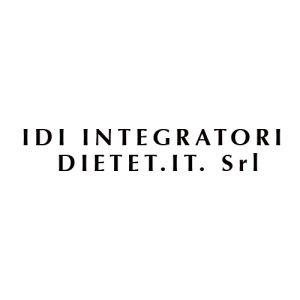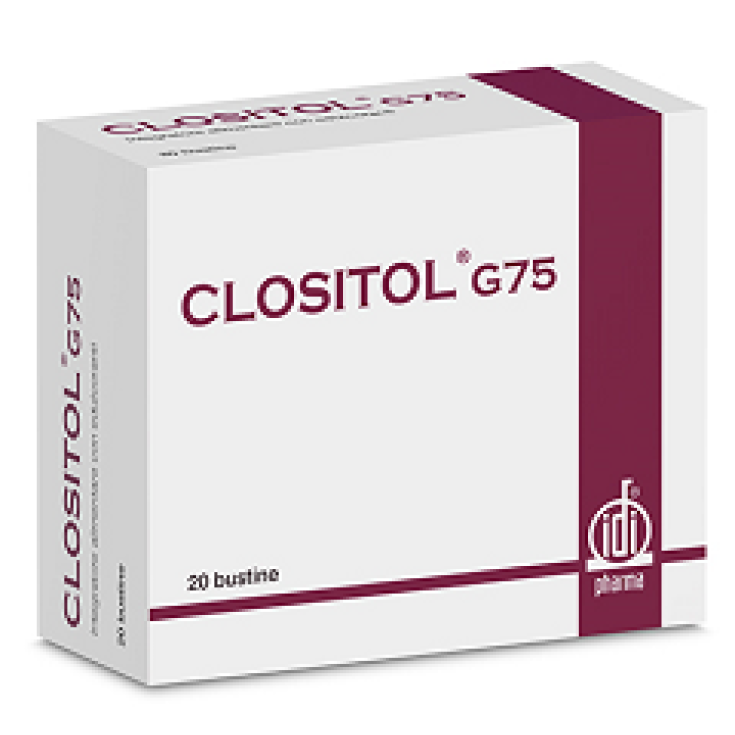Clositol G75 Food Supplement 20 Sachets

- Brand: IDI INTEGRATORI DIETET.IT. Srl
- Product Code: 972164370
- EAN:
- Availability: In Stock
- Purchase 3 items for 22.05€ each
- Purchase 4 items for 21.60€ each
- Purchase 5 items for 21.15€ each
Clositol g75 food supplement sachets what is it for?
Treatment of Polycystic Ovary Syndrome (PCOS) and Female Infertility
Clositol combines the proven efficacy of Inositol with the action of Antioxidants, helping to reduce the metabolic disorders typical of women with PCOS and to restore the physiological function of the ovaries.
It is therefore indicated in the treatment of female infertility, PCOS and menstrual irregularity.
Composition of clositol g75 sachets
Packaging:
CLOSITOL G75 box of 20 sachets
Treatment of Polycystic Ovary Syndrome (PCOS) and Female Infertility
Clositol G75 combines the proven effectiveness of Inositol with the action of Antioxidants, helping to reduce the metabolic disorders typical of women with PCOS and to restore physiological ovarian function.
It is therefore indicated in the treatment of female infertility, PCOS and menstrual irregularity
CLOSITOL
Treatment of Polycystic Ovary Syndrome (PCOS) and Female Infertility
Clositol combines the proven efficacy of Inositol with the action of Antioxidants, helping to reduce the metabolic disorders typical of women with PCOS and to restore the physiological function of the ovaries.
It is therefore indicated in the treatment of female infertility, PCOS and menstrual irregularity
Posology and method of intake of clositol g75 sachets
1 sachet per day for at least 90 days or according to medical opinion
1) Inositol :
Clinical evidence shows that the administration of Inositol in women with PCOS is associated with a reduction in the serum levels of insulin and free and total testosterone. Thanks to its insulin-sensitizing action, Inositol is useful in preventing and correcting the pathophysiological mechanisms that they underlie the metabolic and reproductive alterations associated with PCOS.
CLOSITOL G75 WHAT BENEFITS DOES IT BRING?
Treatment of Polycystic Ovary Syndrome (PCOS) and Female Infertility
Clositol combines the proven efficacy of Inositol with the action of Antioxidants, helping to reduce the metabolic disorders typical of women with PCOS and to restore the physiological function of the ovaries.
It is therefore indicated in the treatment of female infertility, PCOS and menstrual irregularity
Regularizes menstrual cycles
Improve the symptoms of hyperandrogenism
Restores reproductive function
In the follicular fluid of PCOS patients, homocysteine levels are negatively correlated with folate levels
So the oral supplementation of folic acid:
Reduces homocysteine levels
Restores folate concentrations
3) Vitamin C-Vitamin E (natural, it is more effective than the synthetic one):
In patients with PCOS they favor a rapid recovery of the menstrual cycle and the rise in serum levels of vitamins and antioxidant enzymes
4) Lactium :
5) Gymnema sylvestre:
Gymnemic acid is a molecule similar to that of glucose but larger in size and is extracted from the leaves. The action of gymnemic acid seems to take place at 2 levels in our organism:
- in the intestine, where the glucose receptor is reversibly blocked, reducing the absorption of sugars by 50%. The block starts already 60 minutes after administration
- at the level of the taste buds, where the bond with the glucose receptor has the effect of altering the perception of sweet taste, without changing that of salty and bitter.
2 hints on the pathology and some behavioral tips:
Characteristics of the syndrome are an increased production of androgens (including Testosterone
It is therefore indicated in the treatment of female infertility, PCOS and menstrual irregularity
- Alterations of the menstrual cycle, more or less marked delays, oligomenorrhea, amenorrhea
- Hirsutism and acne (both from mild to more severe forms) are the effects of the action of androgens on the skin
- Resistance to the action of insulin, the hormone that regulates sugar metabolism. Insulin resistance prevents cells from using the sugars contained in the blood, which are then stored in the form of fat.
- Overweight
- The latter infertility derives from the fact that, since folliculogenesis and ovulation are altered, the oocyte is not always available for the encounter with the spermatozoa.
The diet for PCOS patients.
Folic acid (Vit.B9 ):
The term folate refers to a group of nutritionally and chemically referable substances to folic acid.
Folic acid is not synthesized in the body but is taken with the diet, its daily requirement under normal conditions is about 0.2 mg.
It plays an essential role in many metabolic reactions in which Vit.B12 also takes part, they participate in the methylation of homocysteine amethionine, in the metabolism of some amino acids and in the synthesis of RNA and DNA.
The lack of folic acid causes a reduction in the synthesis of DNA and RNA and consequently the onset of serious manifestations especially in the cells of the rapidly changing tissues, such as those of the bone marrow.
Folate deficiency in pregnancy is frequent and constitutes a risk factor for the onset of SPINA BIFIDA in the unborn child, a very serious disorder affecting the spinal cord and anencephaly.
Anencephaly and spina bifida are two CNS defects affecting approximately 500,000 children worldwide each year.
The incidence of these malformations could be effectively reduced if women of childbearing age took at least 0.4 mg of folic acid daily before pregnancy and for 3 months thereafter.
It has been shown that regular intake of at least 0.4 mg per day of folic acid prevents the onset of the main neural tube defects (NTD) in newborns (the risk of these diseases is reduced by up to 70% after taking of folic acid.
for folic acid to be effective it must be taken by women of childbearing age in the period preceding pregnancy and in the 3 months following conception.
Folic acid can be taken for long periods without problems, the important thing is not to exceed the dose of 1 mg per day because its excess could hide a possible deficiency of vitamin B12.
Packaging and storage
Clositol g75 sachets is supplied in packs of 20 single-dose sachets ready to use, it is important to keep the product in a cool place away from sources of heat and humidity, keep absolutely out of reach of children.

